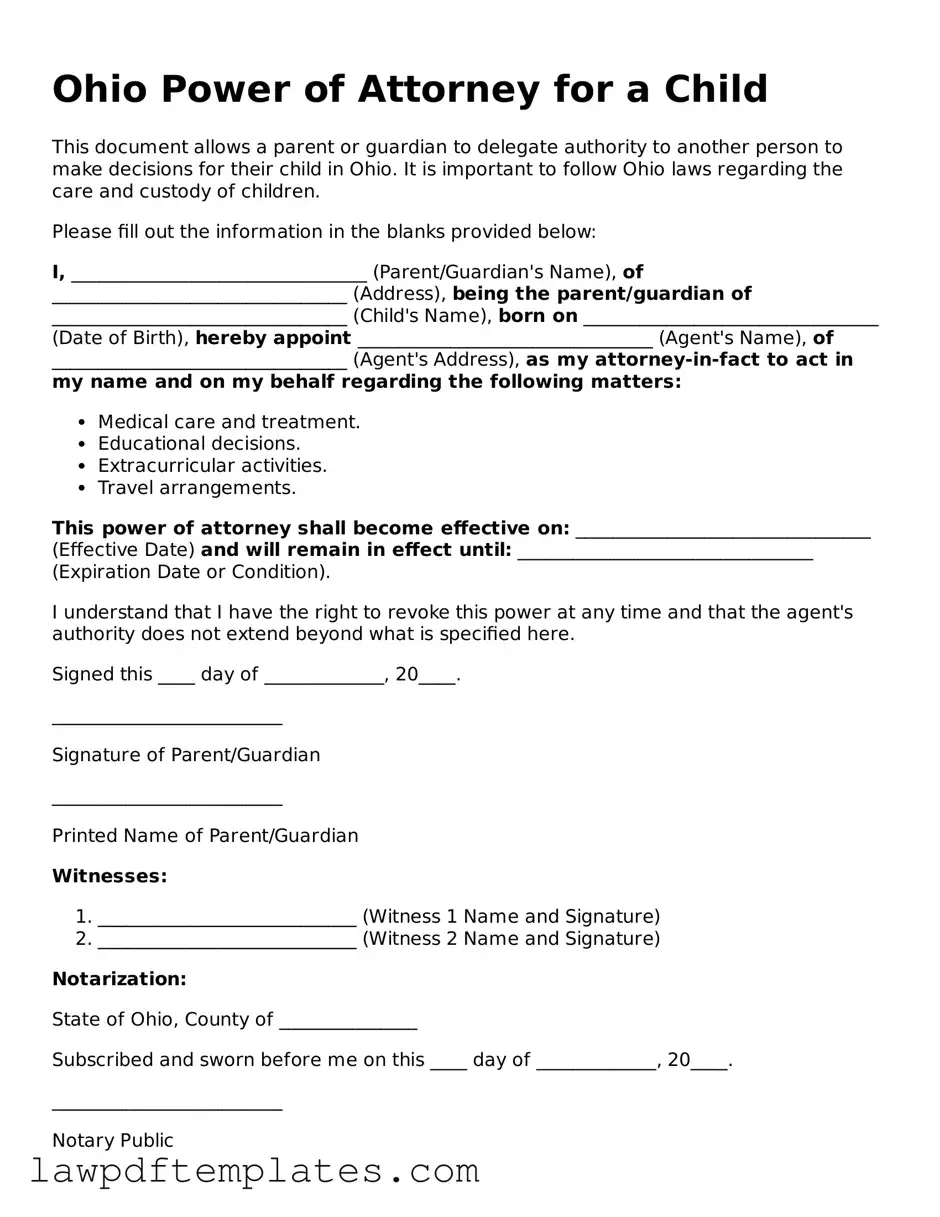Free Power of Attorney for a Child Template for the State of Ohio
Form Breakdown
| Fact Name | Details |
|---|---|
| Definition | The Ohio Power of Attorney for a Child form allows a parent or legal guardian to grant authority to another adult to make decisions on behalf of their child. |
| Governing Law | This form is governed by Ohio Revised Code Section 3109.52, which outlines the legal framework for powers of attorney related to minors. |
| Duration | The authority granted through this form can be limited to a specific period or until revoked by the parent or guardian. |
| Types of Authority | The form can grant authority for various decisions, including medical care, education, and general welfare of the child. |
| Revocation | A parent or guardian can revoke the power of attorney at any time, as long as the revocation is documented in writing. |
| Notarization Requirement | The form must be signed in the presence of a notary public to be legally binding and enforceable in Ohio. |
Sample - Ohio Power of Attorney for a Child Form
Ohio Power of Attorney for a Child
This document allows a parent or guardian to delegate authority to another person to make decisions for their child in Ohio. It is important to follow Ohio laws regarding the care and custody of children.
Please fill out the information in the blanks provided below:
I, ________________________________ (Parent/Guardian's Name), of ________________________________ (Address), being the parent/guardian of ________________________________ (Child's Name), born on ________________________________ (Date of Birth), hereby appoint ________________________________ (Agent's Name), of ________________________________ (Agent's Address), as my attorney-in-fact to act in my name and on my behalf regarding the following matters:
- Medical care and treatment.
- Educational decisions.
- Extracurricular activities.
- Travel arrangements.
This power of attorney shall become effective on: ________________________________ (Effective Date) and will remain in effect until: ________________________________ (Expiration Date or Condition).
I understand that I have the right to revoke this power at any time and that the agent's authority does not extend beyond what is specified here.
Signed this ____ day of _____________, 20____.
_________________________
Signature of Parent/Guardian
_________________________
Printed Name of Parent/Guardian
Witnesses:
- ____________________________ (Witness 1 Name and Signature)
- ____________________________ (Witness 2 Name and Signature)
Notarization:
State of Ohio, County of _______________
Subscribed and sworn before me on this ____ day of _____________, 20____.
_________________________
Notary Public
My Commission Expires: ________________
Common mistakes
When filling out the Ohio Power of Attorney for a Child form, many individuals make common mistakes that can lead to complications. One frequent error is failing to provide complete information about both the child and the agent. It's essential to include full names, addresses, and contact information. Omitting any detail can cause delays or even invalidate the document.
Another mistake is not signing the form in the presence of a notary. The law requires that the Power of Attorney be notarized to be legally binding. Skipping this step can render the document ineffective, meaning the agent may not have the authority to act on behalf of the child.
People often overlook the importance of specifying the duration of the Power of Attorney. Without a clear start and end date, the authority granted may be questioned. It’s crucial to indicate how long the agent will have the power to make decisions for the child.
In addition, some individuals fail to understand the scope of authority they are granting. The form allows for various powers, and it’s important to clearly outline what decisions the agent can make. Vague language can lead to misunderstandings and potential conflicts.
Another common mistake is not discussing the arrangement with the child, if they are of an appropriate age. It’s important to ensure that the child understands who will be acting on their behalf and what that entails. This conversation can help ease any concerns the child may have.
People also sometimes forget to include alternate agents. If the primary agent is unable to fulfill their duties, having a backup can prevent complications. Designating an alternate ensures that there is always someone available to make decisions for the child.
Additionally, failing to review the form for accuracy is a significant oversight. Typos or incorrect information can lead to legal challenges later on. It’s wise to double-check all entries before submitting the document.
Finally, many do not keep copies of the completed form. Retaining a copy is essential for both the parent and the agent. This ensures that everyone involved has access to the same information and can refer to it when necessary.
Discover More Power of Attorney for a Child Templates for Specific States
Witness for Power of Attorney - Parents retain the final say and can modify terms as needed.
Financial Power of Attorney California - The Power of Attorney helps clarify responsibilities among family members during transitions.
For those who want to ensure a smooth immigration process, gathering the necessary documentation, including the I-864 form, is essential. Resources such as PDF Documents Hub can provide helpful guidance on how to complete this important document accurately and efficiently.
Massachusetts Power of Attorney for a Minor Child - The Power of Attorney for a Child can help maintain continuity in your child’s routine.
